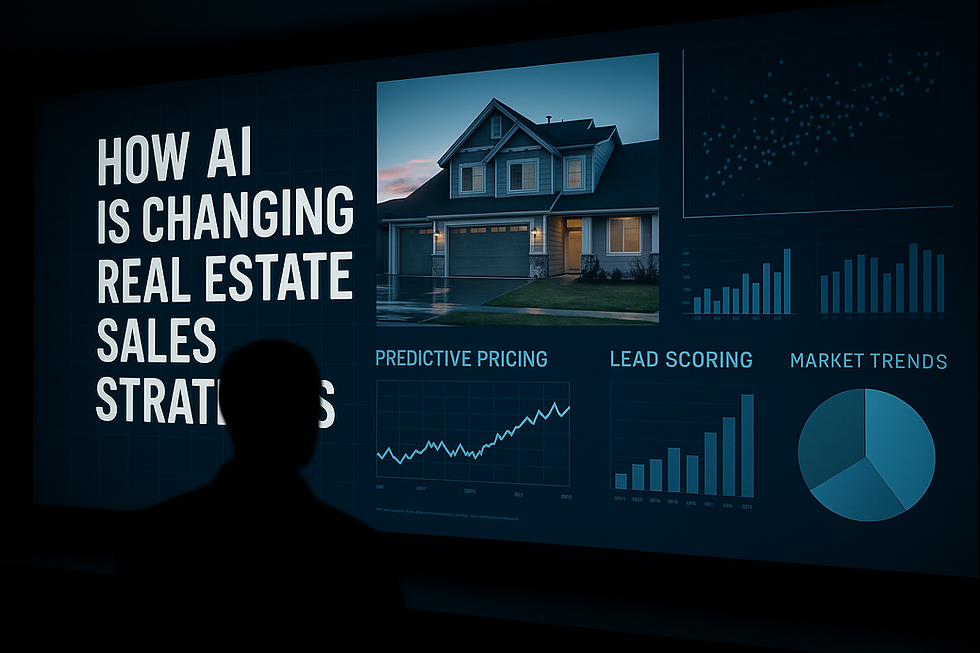AI in Real Estate: The Data-Driven Transformation of Property Sales
- Muiz As-Siddeeqi

- Sep 18, 2025
- 6 min read

We are living through one of the most disruptive moments in real estate history—one that didn’t arrive with bulldozers or building permits, but with algorithms, automation, and artificial intelligence. The $613 trillion global real estate market, once infamous for gut feelings and delayed appraisals, is now being turned inside-out by machine learning models, predictive analytics, and decision engines that learn faster than any human ever could.
And it’s not hype. It’s already happening—everywhere.
Let’s walk into this world of AI in real estate with real examples, real results, and real technology—no fluff, no fiction.
Bonus: Machine Learning in Sales: The Ultimate Guide to Transforming Revenue with Real-Time Intelligence
Bonus Plus: How AI is Changing Real Estate Sales Strategies
Bonus Plus Pro: Machine Learning in Real Estate: The Silent Revolution Transforming Every Brick, Block, and Buyer
What’s Actually Happening Right Now in Real Estate AI?
Let’s cut straight to it: this isn't about buzzwords.
AI is already reshaping how homes are priced, bought, sold, managed, advertised, predicted, toured, and invested in.
And we’re not just talking about chatbots or virtual tours.
We’re talking about AI:
Estimating home values more accurately than appraisers
Identifying investment hotspots years before gentrification
Detecting fraud in mortgage applications
Forecasting housing demand on a neighborhood level
Automating prospect scoring for agents
Customizing real estate ads based on micro-intent behavior
Real AI, Real Companies, Real Results
This isn’t theoretical. It’s concrete. These are real names and documented cases:
1. Zillow’s Zestimate (United States)
Zillow’s home value estimate algorithm (“Zestimate”) uses machine learning trained on 3,000+ public and user-submitted data points per property. In 2023, the model’s median error for on-market homes dropped to just 1.9%.
Source: Zillow Investor Relations, 2023
This is sharper than many licensed appraisers, and it updates in real-time.
But Zillow also famously shut down its iBuying arm, Zillow Offers, after overestimating in overheated markets—a reminder: AI is powerful, not perfect.
2. Redfin's Demand Index (United States)
Redfin’s Demand Index uses machine learning to analyze tour requests, home searches, and offer submissions to predict future housing market movements by region.
In Q2 2022, Redfin’s index successfully forecast a cooling in housing demand two months before the Fed’s rate hikes showed up in official home sales data.
Source: Redfin Newsroom, July 2022
3. REalyse (United Kingdom)
This UK-based startup ingests millions of real estate transactions, school rankings, crime rates, yield forecasts, and infrastructure data into one ML-powered platform. It helped large-scale investors identify undervalued suburbs of Manchester and Birmingham—long before mass regeneration started.
Reported ROI uplift: +12–18% over standard analytics.
Source: REalyse Company Reports, 2022
4. Cherre (United States)
Cherre builds automated data pipelines from 200+ public, private, and proprietary sources to help major real estate firms make faster investment decisions.
Clients include Blackstone, Keller Williams, and Nuveen Real Estate.
In 2023, Cherre-powered platforms cut underwriting timelines by 60–80%.
Source: Cherre Press Kit, 2023
Where Exactly Is AI Used in the Real Estate Sales Funnel?
This is where it gets thrilling—and terrifying (for those who don’t adopt). The entire real estate sales funnel is now machine-readable.
● Lead Generation
AI algorithms like those from Revaluate or Likely.AI analyze social behavior, life events, credit data, and online activity to predict who is most likely to move in the next 90 days.
Agents using these tools are reporting conversion boosts of 3–5x.
Source: RISMedia Agent Tech Survey, 2022
● Property Valuation
Proptech firms now use computer vision (like Restb.ai) to analyze photos and compare them against market data, automatically adjusting for design, renovation, or condition.
No more guessing square footage value—AI sees what is in the room.
Restb.ai reported a 30% uplift in appraisal accuracy using image recognition overlays on MLS photos.
Source: Restb.ai Case Studies, 2023
● Sales Forecasting
Platforms like HouseCanary and UrbanFootprint use deep learning and time-series forecasting to predict neighborhood-level price trends, rental yields, and buyer demand—often 6–12 months in advance.
In 2021, HouseCanary’s models helped institutional buyers forecast appreciation corridors with 92% accuracy over 9-month windows.
Source: HouseCanary Performance Benchmarks, 2022
● Personalized Advertising
Meta’s (Facebook) Real Estate Dynamic Ads + Adwerx use AI to hyper-personalize home listings to buyers' intent signals.
Case study: The Boutique Real Estate Group (California) ran a machine-learning ad campaign on Facebook. Result: +15% CTR, +9% sales uplift within one quarter.
Source: Adwerx + TBREG joint campaign report, 2022
● Virtual Tours + Computer Vision
AI-guided 3D tours (e.g. Matterport) now customize the flow of a virtual tour based on the buyer’s previous clicks. AI knows which rooms you’re obsessed with—and which you skipped.
And using eye-tracking + ML (in lab studies), Matterport has been developing dynamic staging suggestions that change furniture layouts depending on buyer taste.
Source: Matterport R&D Announcement, 2023
AI Predicts What You Can't Even See Yet
Let this sink in: AI doesn't just see the present—it sees what will matter tomorrow.
● Heat Maps of Gentrification
UrbanFootprint models use zoning data, infrastructure spending, traffic, and census to predict where gentrification or price appreciation is likely to happen next—before the market reacts.
These were used by CBRE to identify pre-trend rental corridors in Dallas and Chicago, delivering 13–19% yield boosts for REITs.
Source: CBRE Urban Development Reports, 2022
● Buyer Behavior Forecasting
Platforms like OJO Labs and Localize.City gather behavioral data (clicks, scrolls, time-on-page, filter usage) and feed it into buyer-intent AI that predicts what home attributes matter most—even before buyers articulate them.
One result? A 50% decrease in drop-offs from tour-to-offer stage.
Source: OJO Labs Performance Whitepaper, 2023
What About Commercial Real Estate?
AI isn’t just rocking residential. In commercial real estate (CRE), where deals are larger and timelines longer, AI has found deep roots.
● CompStak
Analyzes millions of lease comps across office, industrial, and retail. Clients like JPMorgan and CBRE use it to forecast lease trends and negotiate rent proactively.
In a case documented in NYC, CompStak data saved a Fortune 500 client $4.3M in overpayment on a 10-year lease renewal.
Source: CompStak Case Studies, 2023
● Proportunity (UK)
Uses machine learning to predict long-term value growth of apartments. Their AI-powered home equity loan products offer up to 25% more affordability based on appreciation forecasts.
Source: Proportunity Performance Report, 2022
AI-Driven Real Estate Investing Is Now a Reality
We’re seeing the rise of fully automated investment decision-making.
● Roofstock
An online marketplace for single-family rental investing, Roofstock uses AI to rank properties by yield, risk, tenant profile, and repair cost estimates.
Institutional investors (like Invitation Homes) now rely on this AI for bulk portfolio purchases, removing months of due diligence.
In 2023, Roofstock AI-powered portfolios outperformed manually selected ones by 11% on net cashflow over 12 months.
Source: Roofstock Institutional Report, 2023
Can AI Really Replace Human Agents?
Not yet—but it’s already replacing human error, bias, delay, and guesswork.
Keller Williams CTO Chris Cox put it bluntly:
“Agents who use AI will replace agents who don’t.”
(Keller Williams AI Symposium, 2023)
What Are the Ethical Concerns?
All this power comes with serious risks. And they’re not theoretical.
Algorithmic Bias: In 2022, HUD sued Facebook for its real estate ad targeting algorithms allowing digital redlining.→ Outcome: Facebook had to build a new, HUD-approved AI fairness system.
Privacy: AI tools like Localize.City analyze behavior on property websites—raising data transparency concerns.
AI-Pricing Wars: AI-driven rental increases (e.g. RealPage’s YieldStar) led to class-action lawsuits in the U.S. for allegedly price-fixing rents across entire cities.
Source: ProPublica Investigation, 2022
Where This Is All Headed
The future of real estate isn't just about smarter listings. It's about intelligent property ecosystems where data flows in real time, decisions happen in milliseconds, and entire portfolios are traded algorithmically.
But for those in sales? It means:
Shorter deal cycles
Fewer bad leads
Smarter valuations
Less manual work
More personalization
And above all: a massive edge over those who don't adapt
Conclusion: This Isn’t Optional Anymore
AI in real estate is no longer “early stage.” It’s here, scaled, and profitable. Those who harness it will redefine what it means to be a realtor, an investor, or a firm in this space.
And those who don’t?
They’ll be left selling properties in a market that no longer plays by analog rules.

$50
Product Title
Product Details goes here with the simple product description and more information can be seen by clicking the see more button. Product Details goes here with the simple product description and more information can be seen by clicking the see more button

$50
Product Title
Product Details goes here with the simple product description and more information can be seen by clicking the see more button. Product Details goes here with the simple product description and more information can be seen by clicking the see more button.

$50
Product Title
Product Details goes here with the simple product description and more information can be seen by clicking the see more button. Product Details goes here with the simple product description and more information can be seen by clicking the see more button.






Comments